Artificial Intelligence in Recruitment: Legal and Ethical Issues
VerifiedAdded on 2023/04/11
|10
|1415
|499
Essay
AI Summary
This essay discusses the increasing role of artificial intelligence (AI) in human resource recruitment, highlighting its benefits and challenges. It traces the history of AI in recruitment back to John McCarthy's proposals in 1956 and examines how AI technologies are being used to improve efficiency in candidate sourcing, screening, and interviewing. The essay addresses concerns about the potential for bias, the loss of personal touch, and the need for legal frameworks to govern AI's application in recruitment. It concludes that while AI offers significant advantages in streamlining recruitment processes, it is essential to balance its use with human oversight to ensure fairness and cultural fit. The essay also points out the importance of addressing the legal lacunae surrounding AI in recruitment by evoking existing legal provisions such as Article 12 of the United Nations Convention on the Use of Electronic Communications in International Contracts.
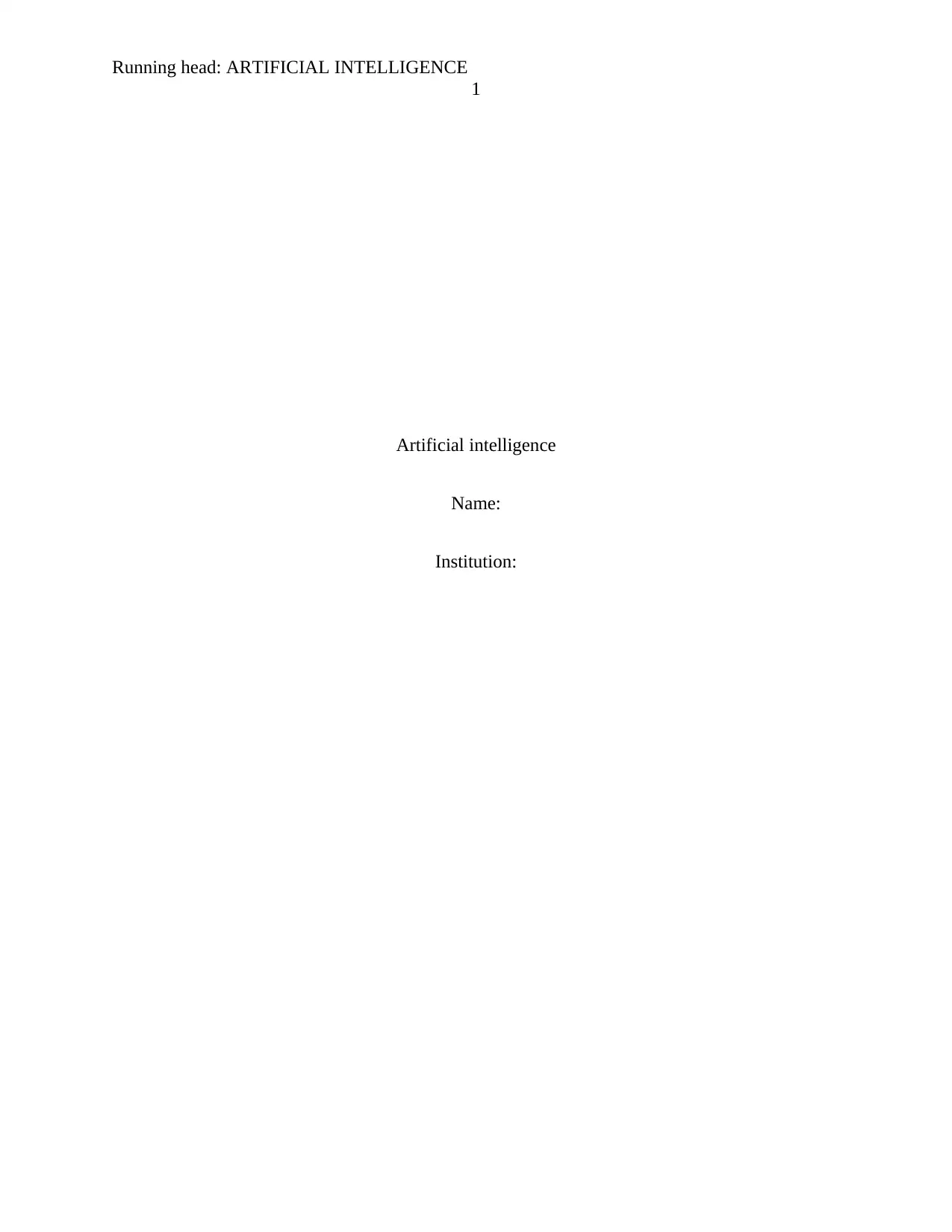
Running head: ARTIFICIAL INTELLIGENCE
1
Artificial intelligence
Name:
Institution:
1
Artificial intelligence
Name:
Institution:
Paraphrase This Document
Need a fresh take? Get an instant paraphrase of this document with our AI Paraphraser
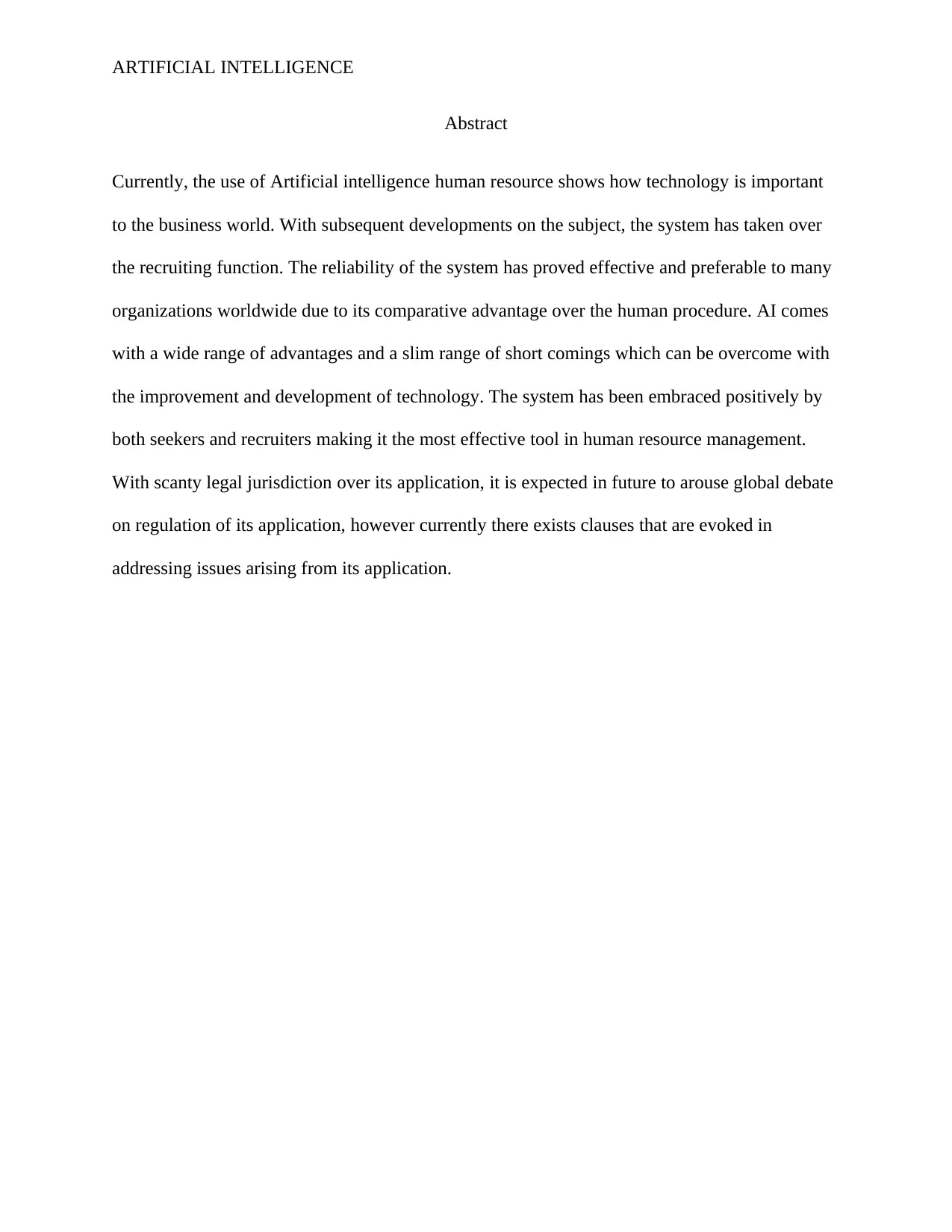
ARTIFICIAL INTELLIGENCE
Abstract
Currently, the use of Artificial intelligence human resource shows how technology is important
to the business world. With subsequent developments on the subject, the system has taken over
the recruiting function. The reliability of the system has proved effective and preferable to many
organizations worldwide due to its comparative advantage over the human procedure. AI comes
with a wide range of advantages and a slim range of short comings which can be overcome with
the improvement and development of technology. The system has been embraced positively by
both seekers and recruiters making it the most effective tool in human resource management.
With scanty legal jurisdiction over its application, it is expected in future to arouse global debate
on regulation of its application, however currently there exists clauses that are evoked in
addressing issues arising from its application.
Abstract
Currently, the use of Artificial intelligence human resource shows how technology is important
to the business world. With subsequent developments on the subject, the system has taken over
the recruiting function. The reliability of the system has proved effective and preferable to many
organizations worldwide due to its comparative advantage over the human procedure. AI comes
with a wide range of advantages and a slim range of short comings which can be overcome with
the improvement and development of technology. The system has been embraced positively by
both seekers and recruiters making it the most effective tool in human resource management.
With scanty legal jurisdiction over its application, it is expected in future to arouse global debate
on regulation of its application, however currently there exists clauses that are evoked in
addressing issues arising from its application.
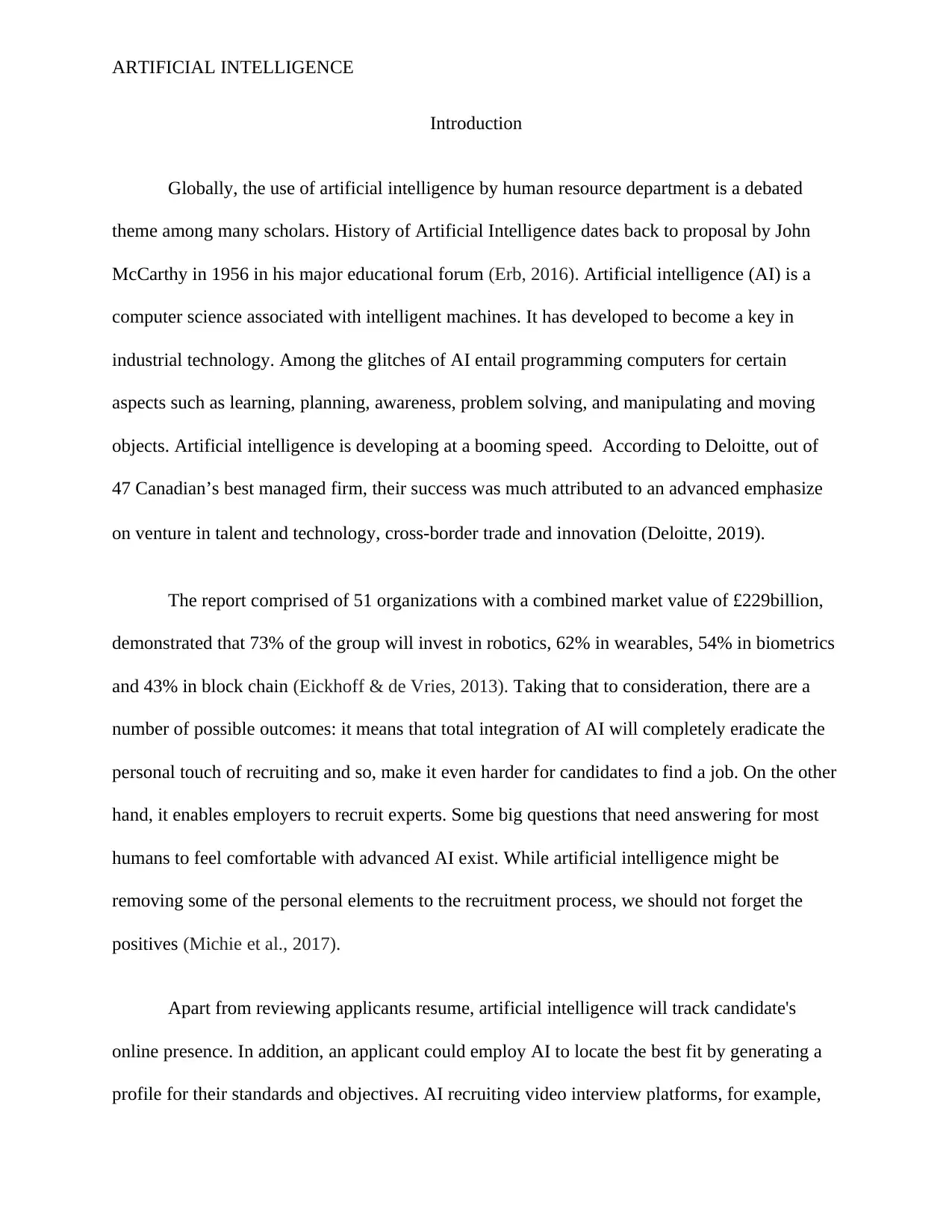
ARTIFICIAL INTELLIGENCE
Introduction
Globally, the use of artificial intelligence by human resource department is a debated
theme among many scholars. History of Artificial Intelligence dates back to proposal by John
McCarthy in 1956 in his major educational forum (Erb, 2016). Artificial intelligence (AI) is a
computer science associated with intelligent machines. It has developed to become a key in
industrial technology. Among the glitches of AI entail programming computers for certain
aspects such as learning, planning, awareness, problem solving, and manipulating and moving
objects. Artificial intelligence is developing at a booming speed. According to Deloitte, out of
47 Canadian’s best managed firm, their success was much attributed to an advanced emphasize
on venture in talent and technology, cross-border trade and innovation (Deloitte, 2019).
The report comprised of 51 organizations with a combined market value of £229billion,
demonstrated that 73% of the group will invest in robotics, 62% in wearables, 54% in biometrics
and 43% in block chain (Eickhoff & de Vries, 2013). Taking that to consideration, there are a
number of possible outcomes: it means that total integration of AI will completely eradicate the
personal touch of recruiting and so, make it even harder for candidates to find a job. On the other
hand, it enables employers to recruit experts. Some big questions that need answering for most
humans to feel comfortable with advanced AI exist. While artificial intelligence might be
removing some of the personal elements to the recruitment process, we should not forget the
positives (Michie et al., 2017).
Apart from reviewing applicants resume, artificial intelligence will track candidate's
online presence. In addition, an applicant could employ AI to locate the best fit by generating a
profile for their standards and objectives. AI recruiting video interview platforms, for example,
Introduction
Globally, the use of artificial intelligence by human resource department is a debated
theme among many scholars. History of Artificial Intelligence dates back to proposal by John
McCarthy in 1956 in his major educational forum (Erb, 2016). Artificial intelligence (AI) is a
computer science associated with intelligent machines. It has developed to become a key in
industrial technology. Among the glitches of AI entail programming computers for certain
aspects such as learning, planning, awareness, problem solving, and manipulating and moving
objects. Artificial intelligence is developing at a booming speed. According to Deloitte, out of
47 Canadian’s best managed firm, their success was much attributed to an advanced emphasize
on venture in talent and technology, cross-border trade and innovation (Deloitte, 2019).
The report comprised of 51 organizations with a combined market value of £229billion,
demonstrated that 73% of the group will invest in robotics, 62% in wearables, 54% in biometrics
and 43% in block chain (Eickhoff & de Vries, 2013). Taking that to consideration, there are a
number of possible outcomes: it means that total integration of AI will completely eradicate the
personal touch of recruiting and so, make it even harder for candidates to find a job. On the other
hand, it enables employers to recruit experts. Some big questions that need answering for most
humans to feel comfortable with advanced AI exist. While artificial intelligence might be
removing some of the personal elements to the recruitment process, we should not forget the
positives (Michie et al., 2017).
Apart from reviewing applicants resume, artificial intelligence will track candidate's
online presence. In addition, an applicant could employ AI to locate the best fit by generating a
profile for their standards and objectives. AI recruiting video interview platforms, for example,
⊘ This is a preview!⊘
Do you want full access?
Subscribe today to unlock all pages.

Trusted by 1+ million students worldwide
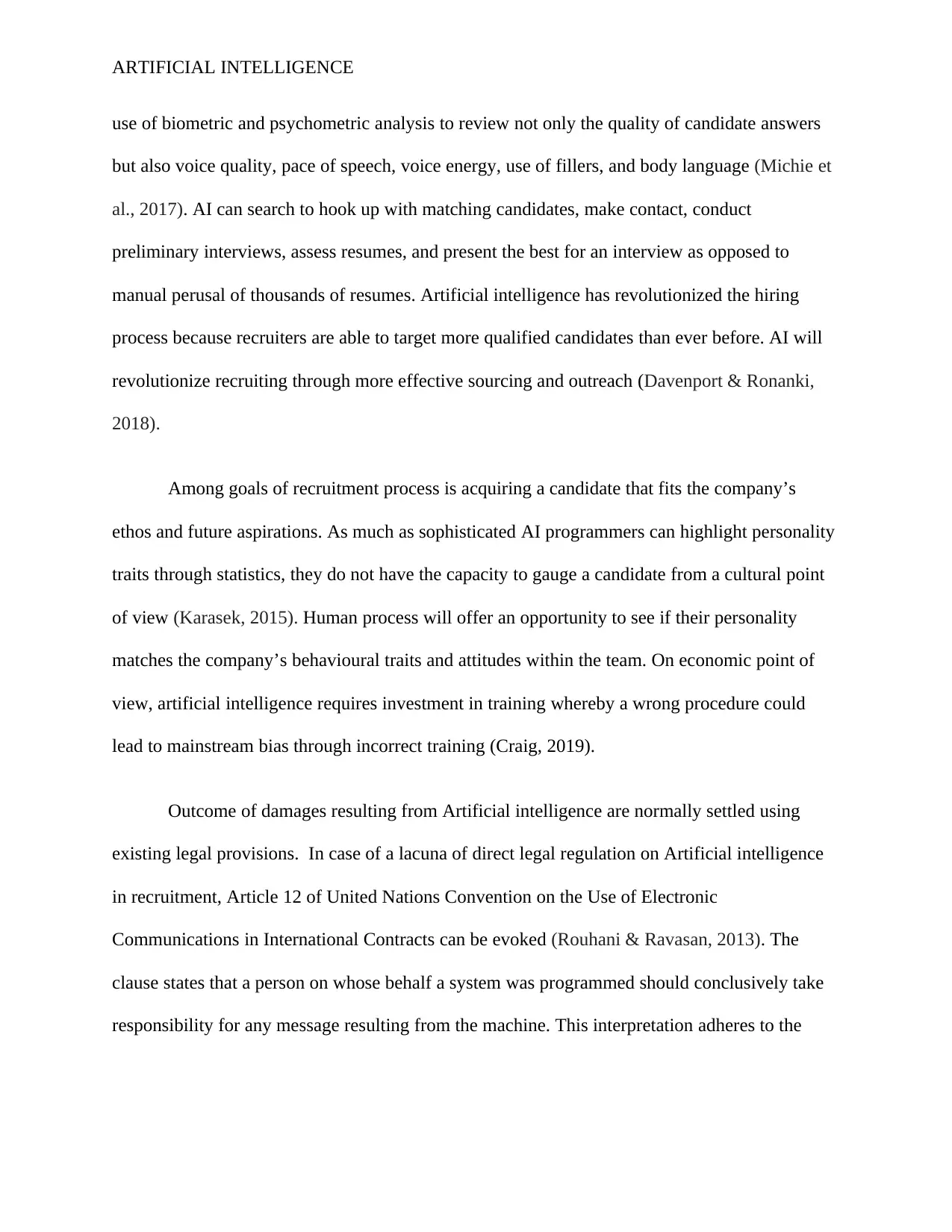
ARTIFICIAL INTELLIGENCE
use of biometric and psychometric analysis to review not only the quality of candidate answers
but also voice quality, pace of speech, voice energy, use of fillers, and body language (Michie et
al., 2017). AI can search to hook up with matching candidates, make contact, conduct
preliminary interviews, assess resumes, and present the best for an interview as opposed to
manual perusal of thousands of resumes. Artificial intelligence has revolutionized the hiring
process because recruiters are able to target more qualified candidates than ever before. AI will
revolutionize recruiting through more effective sourcing and outreach (Davenport & Ronanki,
2018).
Among goals of recruitment process is acquiring a candidate that fits the company’s
ethos and future aspirations. As much as sophisticated AI programmers can highlight personality
traits through statistics, they do not have the capacity to gauge a candidate from a cultural point
of view (Karasek, 2015). Human process will offer an opportunity to see if their personality
matches the company’s behavioural traits and attitudes within the team. On economic point of
view, artificial intelligence requires investment in training whereby a wrong procedure could
lead to mainstream bias through incorrect training (Craig, 2019).
Outcome of damages resulting from Artificial intelligence are normally settled using
existing legal provisions. In case of a lacuna of direct legal regulation on Artificial intelligence
in recruitment, Article 12 of United Nations Convention on the Use of Electronic
Communications in International Contracts can be evoked (Rouhani & Ravasan, 2013). The
clause states that a person on whose behalf a system was programmed should conclusively take
responsibility for any message resulting from the machine. This interpretation adheres to the
use of biometric and psychometric analysis to review not only the quality of candidate answers
but also voice quality, pace of speech, voice energy, use of fillers, and body language (Michie et
al., 2017). AI can search to hook up with matching candidates, make contact, conduct
preliminary interviews, assess resumes, and present the best for an interview as opposed to
manual perusal of thousands of resumes. Artificial intelligence has revolutionized the hiring
process because recruiters are able to target more qualified candidates than ever before. AI will
revolutionize recruiting through more effective sourcing and outreach (Davenport & Ronanki,
2018).
Among goals of recruitment process is acquiring a candidate that fits the company’s
ethos and future aspirations. As much as sophisticated AI programmers can highlight personality
traits through statistics, they do not have the capacity to gauge a candidate from a cultural point
of view (Karasek, 2015). Human process will offer an opportunity to see if their personality
matches the company’s behavioural traits and attitudes within the team. On economic point of
view, artificial intelligence requires investment in training whereby a wrong procedure could
lead to mainstream bias through incorrect training (Craig, 2019).
Outcome of damages resulting from Artificial intelligence are normally settled using
existing legal provisions. In case of a lacuna of direct legal regulation on Artificial intelligence
in recruitment, Article 12 of United Nations Convention on the Use of Electronic
Communications in International Contracts can be evoked (Rouhani & Ravasan, 2013). The
clause states that a person on whose behalf a system was programmed should conclusively take
responsibility for any message resulting from the machine. This interpretation adheres to the
Paraphrase This Document
Need a fresh take? Get an instant paraphrase of this document with our AI Paraphraser
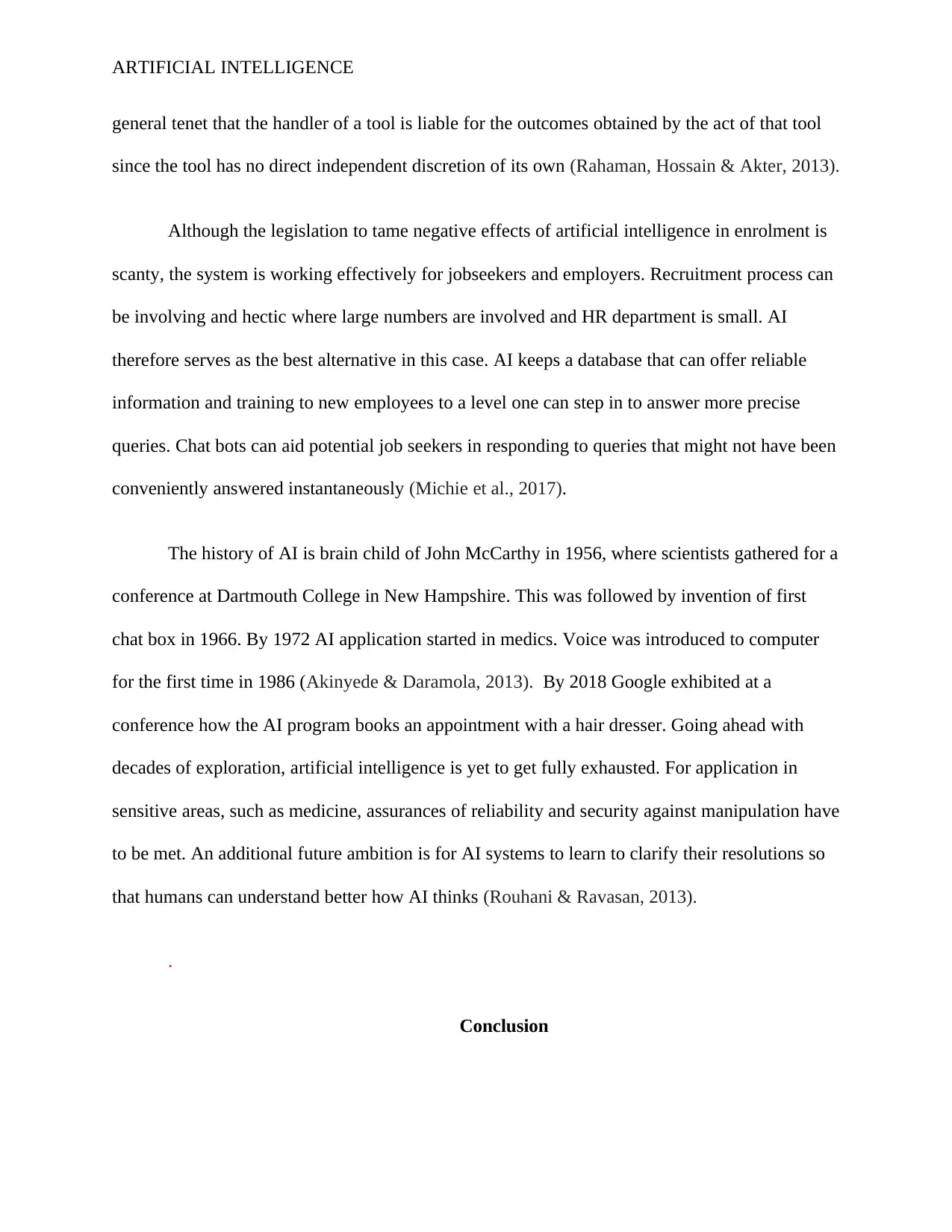
ARTIFICIAL INTELLIGENCE
general tenet that the handler of a tool is liable for the outcomes obtained by the act of that tool
since the tool has no direct independent discretion of its own (Rahaman, Hossain & Akter, 2013).
Although the legislation to tame negative effects of artificial intelligence in enrolment is
scanty, the system is working effectively for jobseekers and employers. Recruitment process can
be involving and hectic where large numbers are involved and HR department is small. AI
therefore serves as the best alternative in this case. AI keeps a database that can offer reliable
information and training to new employees to a level one can step in to answer more precise
queries. Chat bots can aid potential job seekers in responding to queries that might not have been
conveniently answered instantaneously (Michie et al., 2017).
The history of AI is brain child of John McCarthy in 1956, where scientists gathered for a
conference at Dartmouth College in New Hampshire. This was followed by invention of first
chat box in 1966. By 1972 AI application started in medics. Voice was introduced to computer
for the first time in 1986 (Akinyede & Daramola, 2013). By 2018 Google exhibited at a
conference how the AI program books an appointment with a hair dresser. Going ahead with
decades of exploration, artificial intelligence is yet to get fully exhausted. For application in
sensitive areas, such as medicine, assurances of reliability and security against manipulation have
to be met. An additional future ambition is for AI systems to learn to clarify their resolutions so
that humans can understand better how AI thinks (Rouhani & Ravasan, 2013).
.
Conclusion
general tenet that the handler of a tool is liable for the outcomes obtained by the act of that tool
since the tool has no direct independent discretion of its own (Rahaman, Hossain & Akter, 2013).
Although the legislation to tame negative effects of artificial intelligence in enrolment is
scanty, the system is working effectively for jobseekers and employers. Recruitment process can
be involving and hectic where large numbers are involved and HR department is small. AI
therefore serves as the best alternative in this case. AI keeps a database that can offer reliable
information and training to new employees to a level one can step in to answer more precise
queries. Chat bots can aid potential job seekers in responding to queries that might not have been
conveniently answered instantaneously (Michie et al., 2017).
The history of AI is brain child of John McCarthy in 1956, where scientists gathered for a
conference at Dartmouth College in New Hampshire. This was followed by invention of first
chat box in 1966. By 1972 AI application started in medics. Voice was introduced to computer
for the first time in 1986 (Akinyede & Daramola, 2013). By 2018 Google exhibited at a
conference how the AI program books an appointment with a hair dresser. Going ahead with
decades of exploration, artificial intelligence is yet to get fully exhausted. For application in
sensitive areas, such as medicine, assurances of reliability and security against manipulation have
to be met. An additional future ambition is for AI systems to learn to clarify their resolutions so
that humans can understand better how AI thinks (Rouhani & Ravasan, 2013).
.
Conclusion
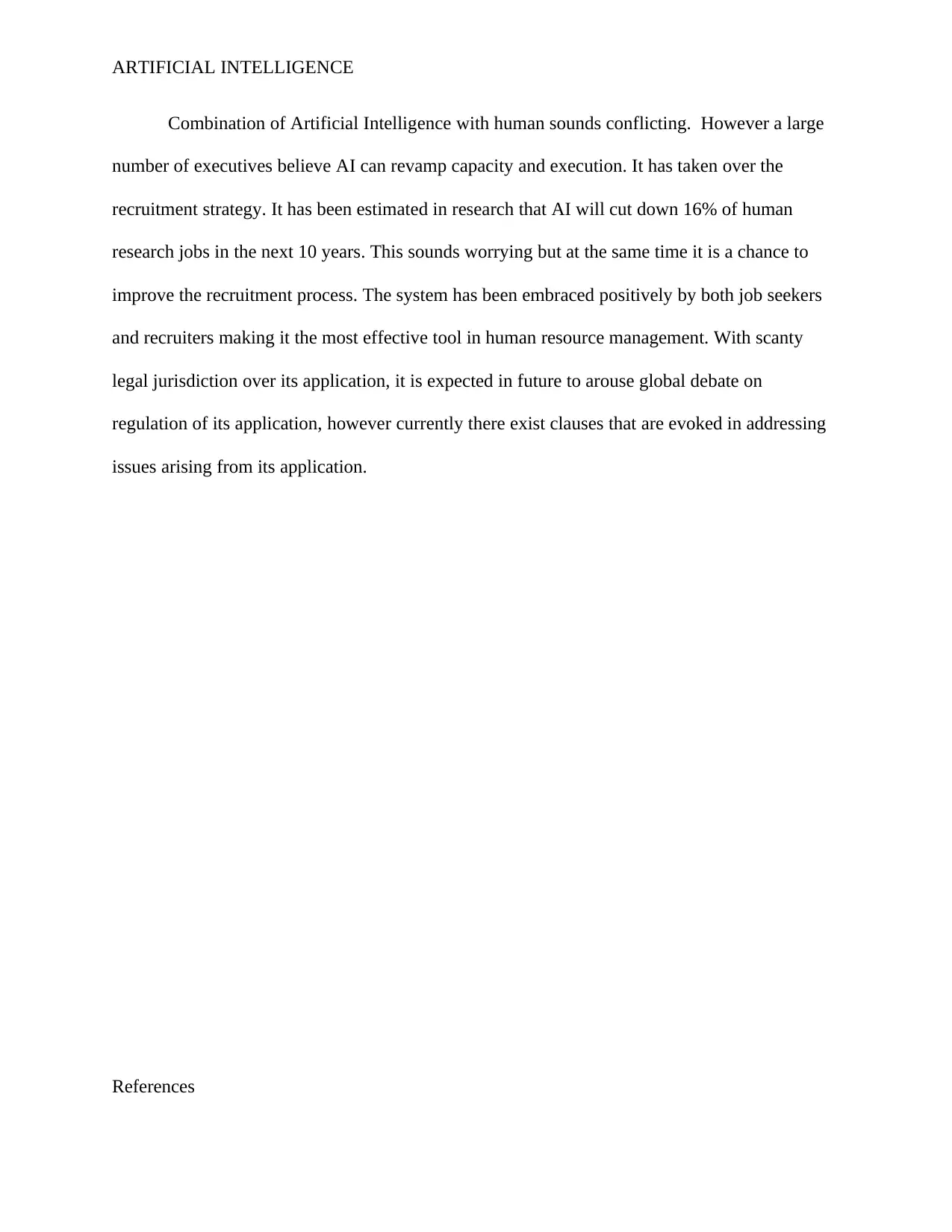
ARTIFICIAL INTELLIGENCE
Combination of Artificial Intelligence with human sounds conflicting. However a large
number of executives believe AI can revamp capacity and execution. It has taken over the
recruitment strategy. It has been estimated in research that AI will cut down 16% of human
research jobs in the next 10 years. This sounds worrying but at the same time it is a chance to
improve the recruitment process. The system has been embraced positively by both job seekers
and recruiters making it the most effective tool in human resource management. With scanty
legal jurisdiction over its application, it is expected in future to arouse global debate on
regulation of its application, however currently there exist clauses that are evoked in addressing
issues arising from its application.
References
Combination of Artificial Intelligence with human sounds conflicting. However a large
number of executives believe AI can revamp capacity and execution. It has taken over the
recruitment strategy. It has been estimated in research that AI will cut down 16% of human
research jobs in the next 10 years. This sounds worrying but at the same time it is a chance to
improve the recruitment process. The system has been embraced positively by both job seekers
and recruiters making it the most effective tool in human resource management. With scanty
legal jurisdiction over its application, it is expected in future to arouse global debate on
regulation of its application, however currently there exist clauses that are evoked in addressing
issues arising from its application.
References
⊘ This is a preview!⊘
Do you want full access?
Subscribe today to unlock all pages.

Trusted by 1+ million students worldwide
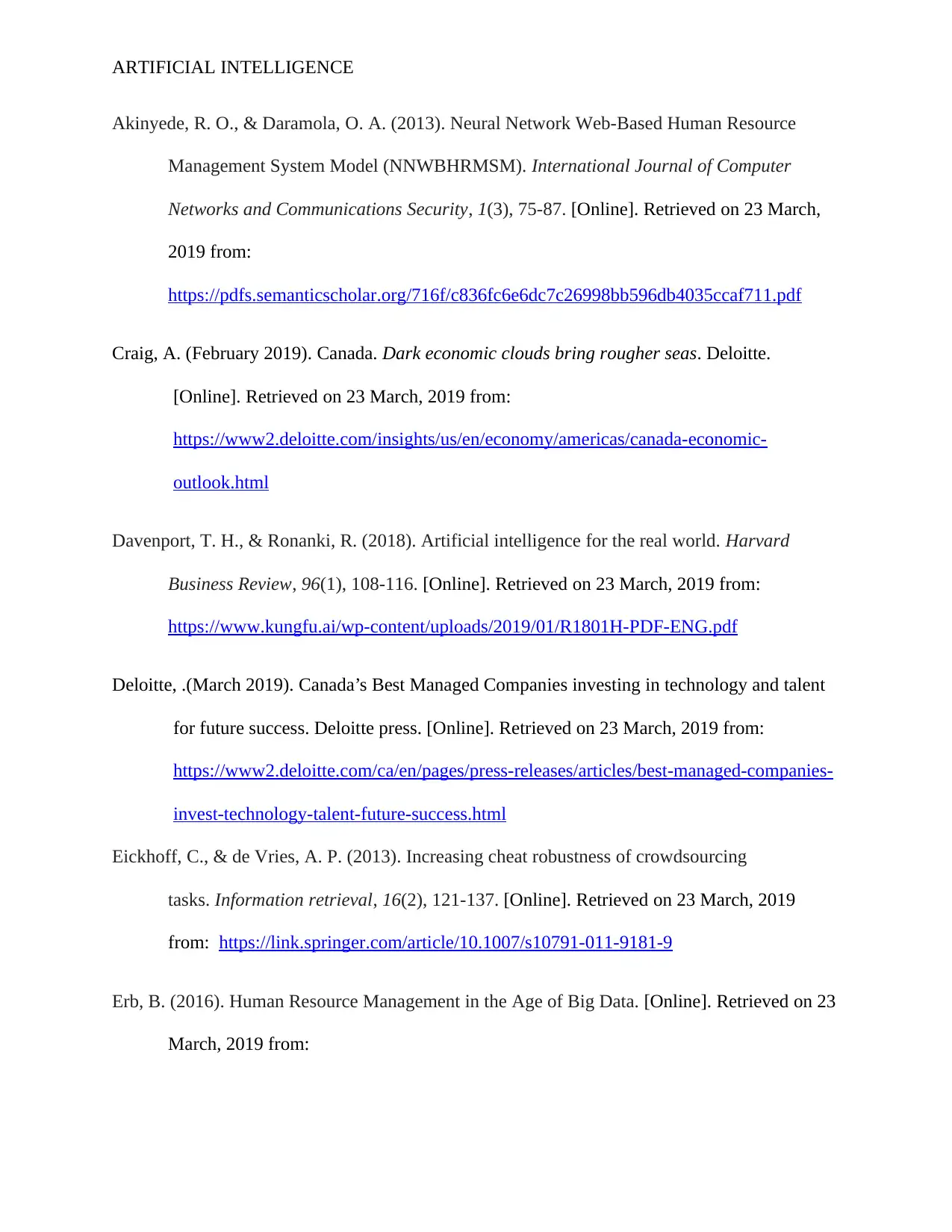
ARTIFICIAL INTELLIGENCE
Akinyede, R. O., & Daramola, O. A. (2013). Neural Network Web-Based Human Resource
Management System Model (NNWBHRMSM). International Journal of Computer
Networks and Communications Security, 1(3), 75-87. [Online]. Retrieved on 23 March,
2019 from:
https://pdfs.semanticscholar.org/716f/c836fc6e6dc7c26998bb596db4035ccaf711.pdf
Craig, A. (February 2019). Canada. Dark economic clouds bring rougher seas. Deloitte.
[Online]. Retrieved on 23 March, 2019 from:
https://www2.deloitte.com/insights/us/en/economy/americas/canada-economic-
outlook.html
Davenport, T. H., & Ronanki, R. (2018). Artificial intelligence for the real world. Harvard
Business Review, 96(1), 108-116. [Online]. Retrieved on 23 March, 2019 from:
https://www.kungfu.ai/wp-content/uploads/2019/01/R1801H-PDF-ENG.pdf
Deloitte, .(March 2019). Canada’s Best Managed Companies investing in technology and talent
for future success. Deloitte press. [Online]. Retrieved on 23 March, 2019 from:
https://www2.deloitte.com/ca/en/pages/press-releases/articles/best-managed-companies-
invest-technology-talent-future-success.html
Eickhoff, C., & de Vries, A. P. (2013). Increasing cheat robustness of crowdsourcing
tasks. Information retrieval, 16(2), 121-137. [Online]. Retrieved on 23 March, 2019
from: https://link.springer.com/article/10.1007/s10791-011-9181-9
Erb, B. (2016). Human Resource Management in the Age of Big Data. [Online]. Retrieved on 23
March, 2019 from:
Akinyede, R. O., & Daramola, O. A. (2013). Neural Network Web-Based Human Resource
Management System Model (NNWBHRMSM). International Journal of Computer
Networks and Communications Security, 1(3), 75-87. [Online]. Retrieved on 23 March,
2019 from:
https://pdfs.semanticscholar.org/716f/c836fc6e6dc7c26998bb596db4035ccaf711.pdf
Craig, A. (February 2019). Canada. Dark economic clouds bring rougher seas. Deloitte.
[Online]. Retrieved on 23 March, 2019 from:
https://www2.deloitte.com/insights/us/en/economy/americas/canada-economic-
outlook.html
Davenport, T. H., & Ronanki, R. (2018). Artificial intelligence for the real world. Harvard
Business Review, 96(1), 108-116. [Online]. Retrieved on 23 March, 2019 from:
https://www.kungfu.ai/wp-content/uploads/2019/01/R1801H-PDF-ENG.pdf
Deloitte, .(March 2019). Canada’s Best Managed Companies investing in technology and talent
for future success. Deloitte press. [Online]. Retrieved on 23 March, 2019 from:
https://www2.deloitte.com/ca/en/pages/press-releases/articles/best-managed-companies-
invest-technology-talent-future-success.html
Eickhoff, C., & de Vries, A. P. (2013). Increasing cheat robustness of crowdsourcing
tasks. Information retrieval, 16(2), 121-137. [Online]. Retrieved on 23 March, 2019
from: https://link.springer.com/article/10.1007/s10791-011-9181-9
Erb, B. (2016). Human Resource Management in the Age of Big Data. [Online]. Retrieved on 23
March, 2019 from:
Paraphrase This Document
Need a fresh take? Get an instant paraphrase of this document with our AI Paraphraser
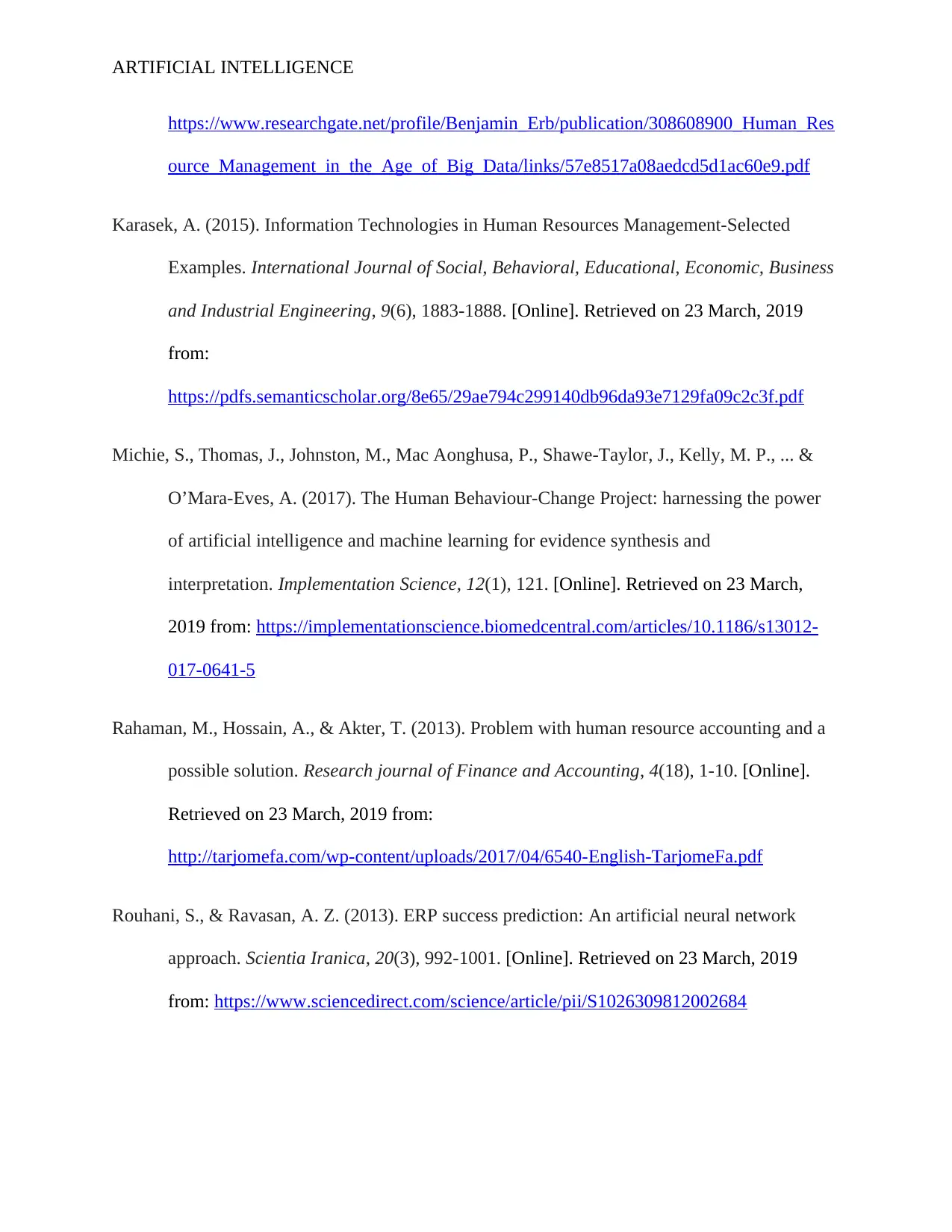
ARTIFICIAL INTELLIGENCE
https://www.researchgate.net/profile/Benjamin_Erb/publication/308608900_Human_Res
ource_Management_in_the_Age_of_Big_Data/links/57e8517a08aedcd5d1ac60e9.pdf
Karasek, A. (2015). Information Technologies in Human Resources Management-Selected
Examples. International Journal of Social, Behavioral, Educational, Economic, Business
and Industrial Engineering, 9(6), 1883-1888. [Online]. Retrieved on 23 March, 2019
from:
https://pdfs.semanticscholar.org/8e65/29ae794c299140db96da93e7129fa09c2c3f.pdf
Michie, S., Thomas, J., Johnston, M., Mac Aonghusa, P., Shawe-Taylor, J., Kelly, M. P., ... &
O’Mara-Eves, A. (2017). The Human Behaviour-Change Project: harnessing the power
of artificial intelligence and machine learning for evidence synthesis and
interpretation. Implementation Science, 12(1), 121. [Online]. Retrieved on 23 March,
2019 from: https://implementationscience.biomedcentral.com/articles/10.1186/s13012-
017-0641-5
Rahaman, M., Hossain, A., & Akter, T. (2013). Problem with human resource accounting and a
possible solution. Research journal of Finance and Accounting, 4(18), 1-10. [Online].
Retrieved on 23 March, 2019 from:
http://tarjomefa.com/wp-content/uploads/2017/04/6540-English-TarjomeFa.pdf
Rouhani, S., & Ravasan, A. Z. (2013). ERP success prediction: An artificial neural network
approach. Scientia Iranica, 20(3), 992-1001. [Online]. Retrieved on 23 March, 2019
from: https://www.sciencedirect.com/science/article/pii/S1026309812002684
https://www.researchgate.net/profile/Benjamin_Erb/publication/308608900_Human_Res
ource_Management_in_the_Age_of_Big_Data/links/57e8517a08aedcd5d1ac60e9.pdf
Karasek, A. (2015). Information Technologies in Human Resources Management-Selected
Examples. International Journal of Social, Behavioral, Educational, Economic, Business
and Industrial Engineering, 9(6), 1883-1888. [Online]. Retrieved on 23 March, 2019
from:
https://pdfs.semanticscholar.org/8e65/29ae794c299140db96da93e7129fa09c2c3f.pdf
Michie, S., Thomas, J., Johnston, M., Mac Aonghusa, P., Shawe-Taylor, J., Kelly, M. P., ... &
O’Mara-Eves, A. (2017). The Human Behaviour-Change Project: harnessing the power
of artificial intelligence and machine learning for evidence synthesis and
interpretation. Implementation Science, 12(1), 121. [Online]. Retrieved on 23 March,
2019 from: https://implementationscience.biomedcentral.com/articles/10.1186/s13012-
017-0641-5
Rahaman, M., Hossain, A., & Akter, T. (2013). Problem with human resource accounting and a
possible solution. Research journal of Finance and Accounting, 4(18), 1-10. [Online].
Retrieved on 23 March, 2019 from:
http://tarjomefa.com/wp-content/uploads/2017/04/6540-English-TarjomeFa.pdf
Rouhani, S., & Ravasan, A. Z. (2013). ERP success prediction: An artificial neural network
approach. Scientia Iranica, 20(3), 992-1001. [Online]. Retrieved on 23 March, 2019
from: https://www.sciencedirect.com/science/article/pii/S1026309812002684

ARTIFICIAL INTELLIGENCE
⊘ This is a preview!⊘
Do you want full access?
Subscribe today to unlock all pages.

Trusted by 1+ million students worldwide

ARTIFICIAL INTELLIGENCE
1 out of 10
Related Documents
Your All-in-One AI-Powered Toolkit for Academic Success.
+13062052269
info@desklib.com
Available 24*7 on WhatsApp / Email
![[object Object]](/_next/static/media/star-bottom.7253800d.svg)
Unlock your academic potential
Copyright © 2020–2026 A2Z Services. All Rights Reserved. Developed and managed by ZUCOL.





